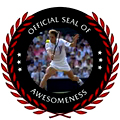Intent of action VS Technicality of action
There is a lot of debate going on now on what is the proper way of teaching, self-teaching and what is a proper way for a player to advance. With the technology moving forward, we are now able to analyze tennis strokes down to the molecular level, with high-speed cameras. All the mechanics are captured on video and played back with endless analysis. There are a lot of "new" coaching sprung around the web and off line, promising great results by virtue of analyzing your strokes, comparing them with Pro strokes and isolating the problem areas, as well as a lot of material for self-teaching. It is all very attractive to us, the players, the coaches, but does it help or hurt our development?
The answer is not simple. In theory, this practice should provide immense help to the player, giving him feedback, video evidence of what he is doing right and what he is doing wrong, but the reality is not such.
Consider this: a Pro player cannot explain what he is doing during his stroke in detail. Most times they will describe "Intent" instead of the action itself. For example: "I need to hit more through the ball".
Such video analysis can lead to ones mind being overwhelmed with details, and the player not even being aware of it. After watching such video, and taking the feedback onto the court, players are more concerned with details of their strokes, attempting to fix them, then with producing that stroke as a whole. This leads to a very mechanical stroke production with tons of checks and balances that a player has to constantly monitor and adjust, until some of them start sinking in to the muscle memory. Problem is, such activity takes a big part of our brain away from the game, suddenly the games seems faster and faster; strokes that produce that wonderful "popping" sound are more rare and miss-hits are more frequent.
Video analysis to me is the core cause of many recreational players nowadays failing in advancing and improving their tennis. They go online, read forums, visit the "magical" websites and attempt to "fix" their strokes on their own. This most times leads to a destruction of a working (but maybe awkward looking) stroke to the point of near no return (especially for the older of us). So many times I have heard the sentence: "my backhand is now better then my forehand, because I tried to FIX my forehand and tried different techniques, now, it just breaks down all the time".
This is where "Intent of action" as opposed to "Technicality of it" comes in. A simple direction from a coach or even yourself, that can accomplish most if not all technical aspects. Something that we already have stored in our long term memory, simple terms that can lead to trigger the muscle memory in the right way, such as "brush up on the ball" or "try to catch the ball with your left hand" and so on. We all know how to perform the action of "brushing", we are doing it for years, a simple trigger for our brains that evokes a certain action by our hand, something that is already stored in both, muscle memory and our brains.
Video analysis should be used for the VERY advanced players, nearing pro level or at pro level and only on the rare occasions where a SMALL technical flaw prevents that player from advancing. Any other applications should be excluded from the real life coaching applications. Personally, I love to analyze the videos and am a member at a few sites that provide such slow motion videos for analysis, but I draw a very thick line between the actual tennis and the video analysis. To me these are two separate subjects that should be rarely mixed together. One is the Intent leading to a positive action, and the other is an afterthought, a way to fix a very fine detail that can be meaningful only at the highest level of tennis.
A good coach to me is not necessarily a good player, but rather a good teacher. Someone who can create the right "Intent" in players mind. A coach needs to be able to put in simple words and terms any action and solicit that action from a player that will lead to desired results. The simpler the feedback the better. The more a coach is able to tap into existing memory and muscle memory - the greater the results. For the more advanced, that includes muscle memories created within tennis environment, such as: "volley has a slice action on it".
Such is my opinion. Whats yours?
Intent of action VS Technicality of action
6 posts
• Page 1 of 1
Intent of action VS Technicality of action
Level 13 Edberg and counting...
-

djarvik - ITST General Manager
- Posts: 13329
- Joined: Fri, 15 Aug 2008 14:57
Re: Intent of action VS Technicality of action
djarvik wrote:A good coach to me is not necessarily a good player, but rather a good teacher.
Amen to that. Far, far, far too often, I see people assume that playing ability is related to teaching ability. In reality, the opposite is probably true. Tennis comes naturally to talented players - most of them probably couldn't really tell you what they are doing. I'm sure most people have heard the expression, "Those who can, do. Those who can't, teach".
Learn by watching good players, and listening to good teachers.
- Rob ITST
- ITST Manager
- Posts: 8260
- Joined: Tue, 20 Sep 2005 01:32
- Location: The Party Capital of the World
That particular discussion is actually not just tennis related but emerges in pretty much any sport. For example in football many former stars try to be a coach and usually get a job at a good club a lot easier then coaches that did not have a top level background. But if you actually look at top coaches over the years the second group is very well represented (maybe even more then the first group, no interest to do a solid search).
Im often amazed at how many top sporters stay within their own field after retiring as pro player. Becoming a pro player has more to do with mentality and talent then anything remotely related to teaching someone how to play.
Im often amazed at how many top sporters stay within their own field after retiring as pro player. Becoming a pro player has more to do with mentality and talent then anything remotely related to teaching someone how to play.
\'Readers are plentiful; thinkers are rare.\'
-

SlicerITST - ITST Manager
- Posts: 5974
- Joined: Sun, 17 Oct 2004 15:17
I think that little "club", that is created in practically every sport, actually hurts that sport. Sure, a former player has the experience of the big stage, all the shots/moves, but majority of times they cannot convey these to their pupils. This is part of the reason you don't see the player-coach types coach anyone who has real problems - young players and junior players, they opt for a developed player and try to help the only way they can - mentally. That and they money of course.
Most Pros do need that kind of help. But to call oneself a coach, when all you do is piggyback on your name/resume in the game and the only real advice you give is "how to think" in a certain situation? I am sorry, but in my opinion this doesn't qualify you as a coach. Part of the entourage - yes. Part of the support group - yes. Maybe even a personal shrink?
I give much more credit to the trainers, to the hard working personal trainers that literally transform players. They are the biggest influence nowadays. Look at Murray and Djokovic. Without a good trainer they would not achieve what they have. Do you think Lendl taught Murray ANYTHING? ...hmmm...if he did - I don't see it. What about Anacone and Federer? "You need to go to net more Roger" - is likely the best advice Fed got. Lets look at Brad Gilbert's resume: Agassi, Rodick, Murray.....why not commit to Donald Young or Gulbis, or Harrson? Someone who has the talent and needs coaching, not just mental support, but actual coaching. And I love all three of the guys, just don't agree with the attention they get, while the real teachers get zero recognition.
But my discussion was aimed at a different angle. I guess it maybe misplaced (in ITST), as there are not many real world players here, mostly gamers. I wanted to discuss the philosophy behind ones development and current methods available. I am just in awe of many, many recreational players that can spell you how to hit a forehand in superfine details, and are the first to jump on a person who tries to simplify things. Yet (I miss that one), they are themselves having major issues with producing that of what they preach.
Most Pros do need that kind of help. But to call oneself a coach, when all you do is piggyback on your name/resume in the game and the only real advice you give is "how to think" in a certain situation? I am sorry, but in my opinion this doesn't qualify you as a coach. Part of the entourage - yes. Part of the support group - yes. Maybe even a personal shrink?
I give much more credit to the trainers, to the hard working personal trainers that literally transform players. They are the biggest influence nowadays. Look at Murray and Djokovic. Without a good trainer they would not achieve what they have. Do you think Lendl taught Murray ANYTHING? ...hmmm...if he did - I don't see it. What about Anacone and Federer? "You need to go to net more Roger" - is likely the best advice Fed got. Lets look at Brad Gilbert's resume: Agassi, Rodick, Murray.....why not commit to Donald Young or Gulbis, or Harrson? Someone who has the talent and needs coaching, not just mental support, but actual coaching. And I love all three of the guys, just don't agree with the attention they get, while the real teachers get zero recognition.
But my discussion was aimed at a different angle. I guess it maybe misplaced (in ITST), as there are not many real world players here, mostly gamers. I wanted to discuss the philosophy behind ones development and current methods available. I am just in awe of many, many recreational players that can spell you how to hit a forehand in superfine details, and are the first to jump on a person who tries to simplify things. Yet (I miss that one), they are themselves having major issues with producing that of what they preach.
Level 13 Edberg and counting...
-

djarvik - ITST General Manager
- Posts: 13329
- Joined: Fri, 15 Aug 2008 14:57
Obviously this post is about tennis, but I play golf far more often than tennis (and I'm much better at it) so I'm going to take it there, and the same thing applies.
So many people pay for video lessons of their golf swing, etc. and it's completely unhelpful. If you're not a really good player, tiny swing adjustments on that level are not only not going to help you, but they're also most likely impossible for you to even deal with because you've got so many bigger issues going on.
You need to know technique up to a certain extent to make a decent swing, but way too many people (and coaches) try to break it down in a way that's not helpful to the average player.
So many people pay for video lessons of their golf swing, etc. and it's completely unhelpful. If you're not a really good player, tiny swing adjustments on that level are not only not going to help you, but they're also most likely impossible for you to even deal with because you've got so many bigger issues going on.
You need to know technique up to a certain extent to make a decent swing, but way too many people (and coaches) try to break it down in a way that's not helpful to the average player.
PSN: edlglide
- edlglide
- Posts: 281
- Joined: Sun, 27 Mar 2011 16:55
- Location: Atlanta, Georgia, USA
I go with intent. Mainly because my stroke feels particularly natural when hitting the ball and when I overly think about details while I'm trying to hit it I can muck it up, and lose the sense of smoothness and naturalness. I'm sure tweaking a stroke by looking at the technicalities can be useful to some people, but I feel intent is the most important.
PSN - Vieira151
"These, are not the hammer...
The hammer is my penis."
"No wine for me. Strange enough things happen when my head is clear. I want to know the difference."
"These, are not the hammer...
The hammer is my penis."
"No wine for me. Strange enough things happen when my head is clear. I want to know the difference."
-

Vieira151 - Posts: 3541
- Joined: Mon, 21 Jul 2008 13:36
- Location: Falkirk, Scotland
6 posts
• Page 1 of 1
Who is online
Users browsing this forum: No registered users and 0 guests